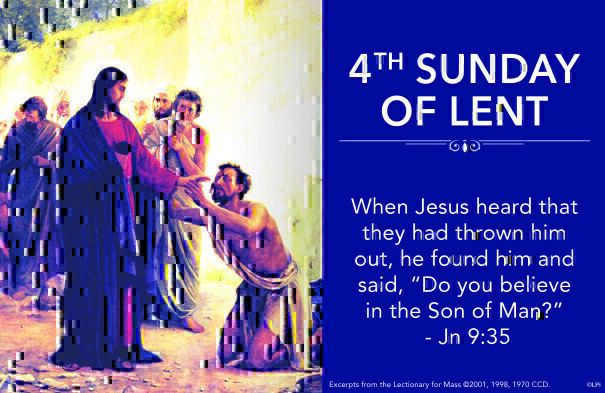
First Reading Joshua 5:9a,10-12
The Israelites celebrate the Passover in the promised land.
Responsorial Psalm Psalm 34:2-7
A prayer of praise to God.
Second Reading 2 Corinthians 5:17-21
Paul preaches our reconciliation with Christ.
Gospel Reading
Luke 15:1-3,11-32
Jesus teaches about forgiveness in the parable of the Prodigal Son.
Background on the Gospel Reading
The parable Jesus tells in today's Gospel is unique to the Gospel of Luke. Jesus has been teaching the crowds as he journeys to Jerusalem. As he teaches, the Pharisees and scribes complain and challenge Jesus because he is welcoming sinners at his table. Today we hear the third of three parables that Jesus tells in response to his critics. These three familiar parables—the lost sheep, the lost coin, and today's parable of the prodigal son—invite us to consider the depth of God's mercy and love.
The Pharisees taught a scrupulous observance of Jewish Law. In their interpretation and practice, observant Jews who shared table fellowship with sinners would be made unclean. Like Jesus, the Pharisees hoped to lead sinners back to God. The Pharisees, however, required that sinners first become ritually clean—observant of the Pharisees' interpretation of Jewish Law—before sharing table fellowship. This appears to be one of the major differences between the Pharisees and Jesus. Jesus reaches out to sinners while they are still sinners, inviting them to conversion through fellowship with him. Jesus is God acting among us; by befriending us, he is inviting us to return to friendship with God. Through friendship with Jesus, our sins are forgiven and we, in turn, bear fruit for God. Recall last Sunday's Gospel and the barren fig tree.
Our familiarity with today's parable risks dulling us to its tremendously powerful message. We call this the parable of the lost son or the prodigal son. Any focus on the younger son, however, must also be balanced by an examination of the unusual behavior of the father.
First we must imagine our first response to the audacity of a son who asks for his inheritance before his father has died. Indignation would certainly be a justifiable response to such a request. Yet the father in this parable agrees to honor the son's request and divides his property among his two sons. How might we describe such a father? Foolish comes to mind, but so does trusting. Without property of his own, the father must rely upon his sons to provide for his well-being.
The younger son takes his inheritance and leaves home. The older son remains, continuing to provide for the father and the household. Having been disgraced by the younger son, the father spends some time watching the road for the return of the lost son. When he eventually sees his wayward son returning, the father not only welcomes him but also runs out to greet him and then honors him with a party. We say that this father is loving and forgiving. Yet these adjectives only begin to describe the depth of love and mercy that characterize the father.
We find no surprise in the anger of the older son. Yet the father appears sad and even confused by the older son's indignation. He says in reply that they should celebrate because the lost son had returned. The father is filled with gratitude and love for the older son's faithfulness. This love is in no way diminished by the father's rejoicing at the return of the younger son. Yet the older son's jealousy reveals his limited understanding of the depth of his father's love.
The Fourth Sunday of Lent is traditionally called Laetare Sunday. Laetare is a Latin word that means “rejoice.” Today's Gospel describes the reason for our joy: God's great love for us has been revealed in Jesus. Through his Passion, Death, and Resurrection, Christ has reconciled us with God and one another.
No comments yet. Be the first to say something!